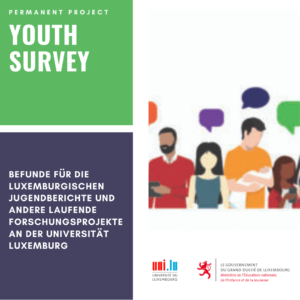For a conference on the environmental responsibility of young people, Service national de la Jeunesse had invited researchers and practitioners to Marienthal on 05.07.2023. There, Dr. Caroline Residori and Hamid Bulut (Centre for Childhood and Youth Research, CCY) presented statistical trends on the ecological behaviour and attitudes of young people, based on current data from Youth Survey Luxembourg (YSL) 2021, as well as from the complementary survey Young People and COVID-19 (YAC) 2021, both of which include questions on ecological attitudes. In a subsequent discussion, Dr. Caroline Residori gave impulses on which form of project work may support young people in their environmental responsibility.
Jump to content
Young people in Luxembourg are afraid for the climate
Environmental pollution and climate change – these issues scare young people. The Youth Survey Luxembourg shows for the year 2021 that about 70% of the 12 to 29 year-old respondents are afraid of both of these societal challenges. Pollution and climate change have already been appearing in the top 3 spots of the biggest fears of young people in Luxembourg every year since 2019 – along with the fear of suffering a serious illness.
Environmental responsibility (also called ecological responsibility) – this means advocating for the preservation of the environment due to the current pressures on it (pollution, climate change and resource scarcity), and advocating for the sustainable use of its resources. All social actors bear ecological responsibility and can behave ecologically. However, scientists agree that individuals need appropriate environmental knowledge to do so. This should go hand in hand with appropriate environmental attitudes and behaviour.

Discrepancies in the ecological attitudes and behaviour of young people
Environmental or ecological attitudes can be classified in different ways. Science distinguishes three major dimensions of environmental attitudes: Knowing that the environment is suffering in climate change (cognitive dimension), feeling affected by the degradation of nature (affective dimension), and wanting something to be done about it (conative dimension). Who has what attitude towards the environment? This is influenced above all by demographic characteristics, social influences, but also media and information, as well as political framework conditions.
The latest data from the Youth Survey Luxembourg (2021) show that many young people in Luxembourg feel very affected by climate change. However, the level of knowledge and willingness to act still lag behind this dimension of environmental attitudes: the cognitive (knowing) and conative (wanting) dimensions of ecological attitudes are thus less pronounced than the affective (feeling affected) dimension.
Young people in Luxembourg clearly feel affected by climate change. However, their trends on ecological behaviour showed a discrepancy with ecological attitudes. Compared to their attitudes, young people were significantly less likely to say that they actually behaved ecologically: for example, not eating meat for main meals, or buying organic products at the supermarket.
Environmental responsibility: impulses for Luxembourg’s youth landscape
Those who want to evaluate the ecological behaviour of young people should note, however, that it is difficult to lump all young people together: their environmental behaviour is not homogeneous and influencing factors change from behaviour to behaviour. During the conference “Eco-Responsabilité an d’Bedeitung fir de Jugendsecteur“, Dr. Caroline Residori and Hamid Bulut made it clear that climate change and its consequences are global challenges that shape the awareness and emotions of many young people:
Many young people are aware of the importance of climate change and are committed to protecting the environment.
However, active promotion and the design of structural framework conditions that facilitate ecologically sustainable behaviour and lifestyles are indispensable in order to address the environmental awareness of many young people, and to counter fatalistic resignation and support ecological lifestyles,” say the researchers from the Centre for Childhood and Youth Research at the University of Luxembourg.







